
by Clair Mooney | 22 Feb, 2022 | Main News Feed
FIS is pleased to announce that Philip Brown has been elected as Vice President of its executive board.
A member of the FIS board of directors for six years, Philip has more than 45 years’ experience in the construction industry. He started out as an electrical apprentice before going on to project manage numerous interior works, gaining in depth knowledge and experience within the industry before joining Meronden Ltd in 1997 as director.
“I am looking to build upon the good work that the board has achieved by actively encouraging the increase of new members whilst maintaining the high standards achieved within the membership,” said Philip. “I am also keen to increase the profile of the association within the industry, ensuring it is associated with quality, commitment and prestige.”
Philip continued: “I believe that as a specialist industry, by working in association with one another we are able to share information, ideas, trends and best practice which will enable each member to succeed in today’s challenging and ever-changing market.”
Commenting on the new appointment, FIS CEO Iain McIlwee said:
“Philip has already made a huge contribution whilst on the board and has been instrumental in the development of a number of key projects. Add this to his exceptional track record across the finishes and interiors sector, and we have the ideal Vice President. Philip will play a crucial role in taking FIS onto its next chapter of growth and success.”
For further information or for any questions please contact the FIS at info@thefis.org or call 0121 707 0077.
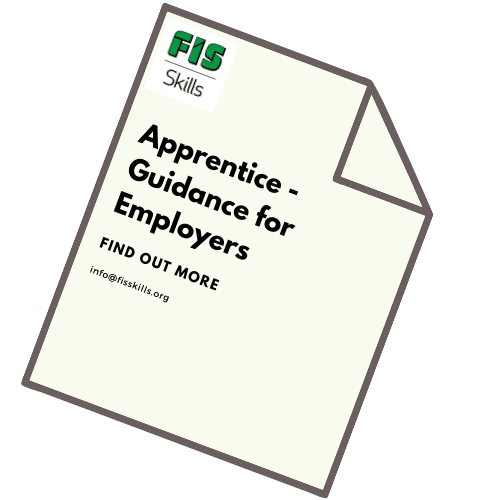
by Clair Mooney | 17 Feb, 2022 | Skills
Apprentices are a vital investment in the future. A well managed programme can help enhance productivity, improve business performance and develop a committed and competent workforce.
To help support businesses in taking on an apprentice, FIS has created a useful guide detailing the support and funding available to help you to make your apprenticeship programme a success. It provides employers with the information needed to recruit, register and secure funding for apprentices. The guide includes information on the apprenticeship funding pledge and receive system and details on the CITB Grant ‘Travel to Train’.
The guide also includes access to the CITB Apprenticeship Recruitment Toolkit, which provides further guidance for recruiting and supporting apprenticeships. The toolkit details the various routes to hiring an apprentice across England, Scotland, and Wales. There is also, a choice of four other sections to explore, including support available from CITB. This includes assisting employers with completing paperwork, or financial support, with a breakdown on how to claim funding and CITB grants for apprentices.
If you would like to talk through the options for employing apprentices give us a call, 0121 707 0077 or email info@thefis.org we will be happy to help.
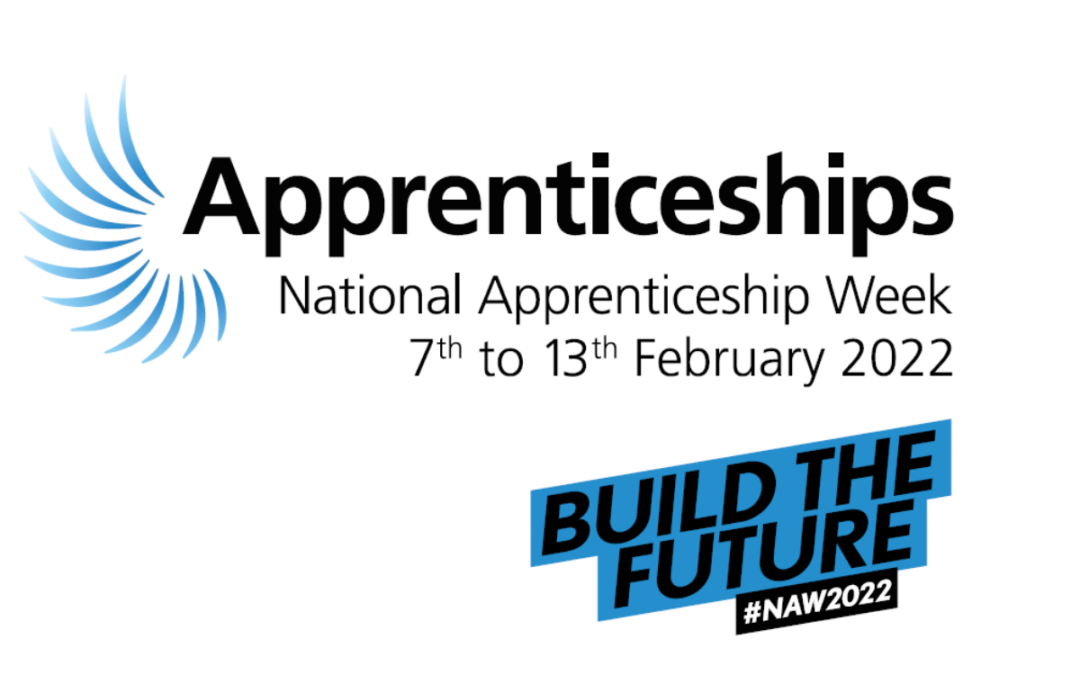
by Clair Mooney | 11 Feb, 2022 | Skills
National Apprenticeship Week 2022 is well underway and this year’s theme ‘Build the Future’ provides an opportunity for organisations to inform young people in England and Wales how they can pursue a rewarding career in construction and showcase the contribution they are making to the future finishes and interiors workforce.
It also ensures as a sector, we come together and celebrate apprenticeship journeys and successes as well as to say ‘Thank You’ to everyone who makes them possible.
We are thrilled to have seen so many members get involved showcasing their apprentices. If you haven’t already done so, it’s not too late to get involved!
• Celebrate your apprentices ‐ Put your apprentices front and centre of your business and on social media using the hashtag #NAW2022
• Use your Apprenticeship Levy ‐ make sure you are using your Apprenticeship Levy or pledging it to other employers in your supply chain via the Apprenticeship Levy Transfer to help them deliver their apprenticeships.
• Promote your apprenticeship vacancies ‐ Ensure all your apprenticeship opportunities are registered on the FIS JobSpot and let us know about work placement opportunities.
Support and advice
The FIS website has a range of tips and advice on how you can look at taking on apprentices, including our FIS Apprentice – Guidance for Employers.
We can also support you in taking on an apprentice and accessing the appropriate funding. Contact the FIS team on 0121 707 0077 or email info@thefis.org to start the conversation.
For updates during the week follow FIS on Twitter or FIS on Linkedin and if you are sharing an apprenticeship story, please tag us in so we can help amplify on behalf of our community.

by Clair Mooney | 11 Feb, 2022 | Main News Feed

by Clair Mooney | 10 Feb, 2022 | Skills
Employers in England that pay the apprenticeship levy can transfer their unused apprenticeship funds to help other organisations pay for apprenticeship training. The employer that receives the funds can only use them to pay for apprenticeship training and assessment. You can transfer up to
25% of your apprenticeship funds.
Prior to sign up you will need an apprenticeship service account
Create an account to manage apprenticeships – Manage apprentices (manage-apprenticeships.service.gov.uk)
Transferring Your Apprenticeship Levy to Another Business
Transferring your apprenticeship levy to another business – GOV.UK (www.gov.uk)
An apprenticeship levy paying employer can transfer up to 25% of their annual levy funds to another employer to pay for the training and assessment costs for apprenticeship standards. Transfers can support new apprenticeship starts, this includes existing staff starting an apprenticeship or where the apprentice’s employer has changed. Transfers may be used to support the skills gaps and shortages within locations or sectors.
Receive a Levy Transfer from another Business to Fund an Apprenticeship
Receive a levy transfer from another business to fund an apprenticeship – GOV.UK (www.gov.uk)
Transfers is one way of receiving funding to support the costs of apprenticeship training and assessment. By receiving a transfer, if you do not pay the levy then you will save the 5% employer co-investment. Also, transfers do not count towards reservation of funds. Apprenticeships are not just for new employees; they are available to upskill existing employees too.

by Clair Mooney | 10 Feb, 2022 | Skills
Way to Work is a new partnership between government and employers to get 500,000 jobseekers into work by the end of June 2022.
This partnership will help fill the large number of vacancies and help job-ready people into the labour market. If you are looking to fill a vacancy, Jobcentre Plus can offer you a named employer adviser in your local jobcentre, or a dedicated national account manager if you are a national employer.
For more information- Way to Work – JobHelp (campaign.gov.uk)
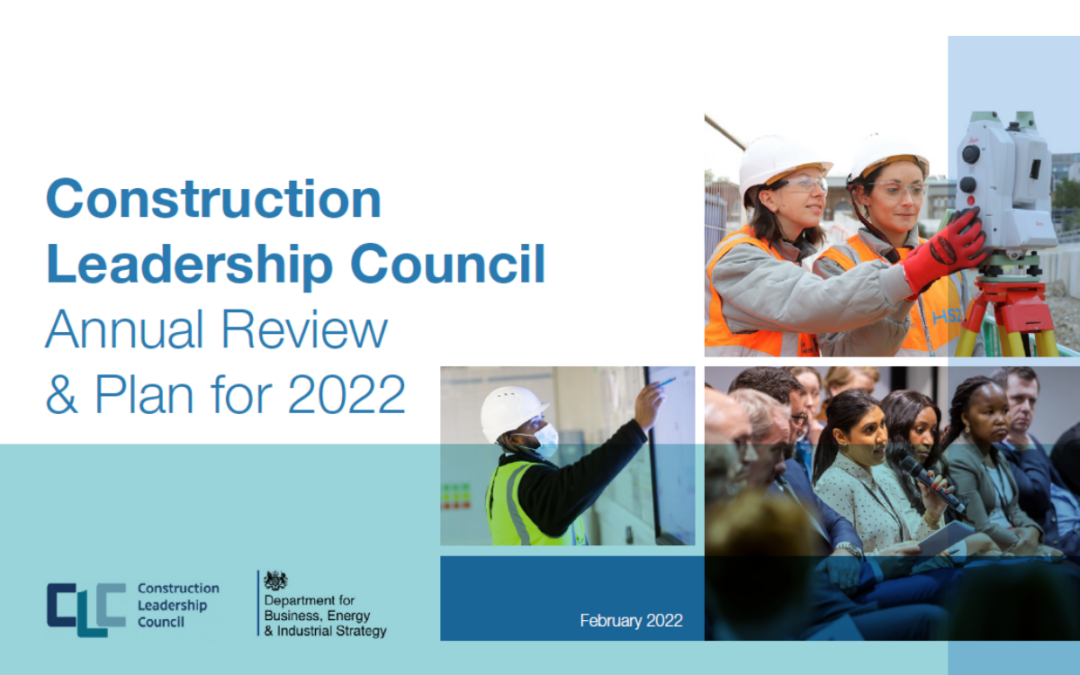
by Clair Mooney | 7 Feb, 2022 | Main News Feed
The Construction Leadership Council has set out four priorities to deliver a better UK construction sector in 2022.
The Council has picked issues where there is the greatest need for collaborative industry action, and the greatest opportunity to deliver positive change. The four priorities for 2022 are:
- Net Zero Carbon
- Building Safety
- Meeting the Skills Challenge
- Implementing the Construction Playbook
The announcement of the four priority areas comes as the CLC published its Annual Review for 2021.
Having established itself as the leading force for the industry in 2020 with its response to Covid-19, in 2021 the CLC built on this success. It led UK construction’s work ahead of the COP26 climate change summit with CO2nstructZero, while also responding promptly to the emerging threat of materials shortages to improve product availability nationwide. It launched a single hub for all new entrant jobs – TalentView Construction – while setting out the first ever Skills Plan for the whole UK construction industry.
Among its objectives this year it is targeting apprenticeships, aiming to return numbers to pre-Covid levels to meet future skills needs. It will publish quarterly data to show the sector’s journey to zero carbon. On Building Safety, it will work with partners to roll out frameworks to ensure that those working on buildings have the competence to build and maintain them safely. And it will continue its work to promote the Government’s Construction Playbook, boosting awareness and implementation among clients and suppliers.
CLC co-chair Andy Mitchell CBE said:
“Having lit the spark in 2020, and watched it grow last year, the CLC can deliver transformational change for UK construction in 2022. We know that some of the threats facing our sector are daunting, but we are now working together as a sector, talking on challenges with a united approach. I hope that when we come to write our Annual Review for 2022 the whole sector will be able to judge us by our successes in delivering real change”
CLC co-chair and Construction Minister Lee Rowley MP said: During 2021, the industry demonstrated its ability to adapt to manage the ongoing challenge of COVID-19, and also its willingness to improve, and to start to tackle the need to transform the sector so it can consistently deliver better-performing, safer and more sustainable buildings and infrastructure.
However, we can’t rest on our laurels. We will continue to face challenges during 2022. Only by working together collectively, will we continue to meet these challenges, and truly build back better, faster and greener for future generations.

by Clair Mooney | 2 Feb, 2022 | Main News Feed
Half of Build UK Contractor members now pay in an average of 30 days or less, according to the latest results published under the Duty to Report on Payment Practices and Performance.
Despite the ongoing challenges presented by the COVID‐19 pandemic, payment performance has improved again over the last six months, underlining how the increased transparency provided by the Build UK table is transforming the industry culture around payment. Contractor members are now reporting an average of 32 days to pay invoices, down from 34 days last July and 45 days when Build UK first published the information in July 2018. On average, they now pay 95% of invoices within 60 days, up from 82% three years ago, and 82% of their invoices are paid within terms, compared to just 61% in 2018.
FIS Chief Executive Iain McIlwee said “There are some good signs here, but let’s not get complacent – we know from our work with the Small Business Commissioner that most complaints against the Prompt Payment Codes still relate to construction and that the payment issue is more nuanced than when the invoice is raised and paid.
Basically these numbers, whilst positive, don’t present the full picture. We have been working with colleagues in the CLC to highlight this and look at the potential to include value as well as volume of invoice to provide a clearer picture and limit the potential for companies to distort their figures by paying a high volume of small invoices via credit card and also to look at how compliance and the data provided is monitored.”
Build UK’s table features more than 100 of the industry’s largest companies, including contractors, clients and housebuilders, to provide a picture of payment practices across the construction industry.

by Clair Mooney | 1 Feb, 2022 | Main News Feed
The Cabinet Office has published the
independent review of public sector frameworks undertaken by Professor David Mosey, which sets out 24 recommendations for a new ‘Gold Standard’ designed to
‘improve the outcomes delivered by framework strategies procurement, contracting and management and to avoid the pitfalls of bureaucratic and inconsistent practices’. By helping clients and suppliers to create and implement Gold Standard action plans under current frameworks, it is hoped that Government and industry can achieve the objectives of the
Construction Playbook to deliver projects ‘faster, better and greener’.
Recommendation 20 promotes the use of the Common Assessment Standard to ‘reduce procurement costs by consistent and proportionate assessment of [suppliers’] economic and financial standing’. The Common Assessment Standard is being rolled out across the industry with a growing list of organisations using it for their PQ requirements, and members of the supply chain can obtain certification from any one of three Recognised Assessment Bodies ‐ Achilles, CHAS or Constructionline.

by Clair Mooney | 1 Feb, 2022 | Health and Safety
As part HSE’s ongoing Working Minds campaign, spot checks will be conducted to inspect how employers are recognising work-related stress – to help support and sustain good mental health in the workplace.
To help you support employees with stress and stay on the right side of the law, the Health & Safety experts of FIS Associate Member Citation, have put together an exclusive guide on stress risk assessments – including how to recognise the signs of stress and assess the risks involved.
DOWNLOAD HERE: https://tinyurl.com/fis22stress
FIS member benefit
If you’d like to chat about how Citation can help with the HR and Health & Safety side of your business, just give them a call on 0345 844 1111, or fill in their call-back form and they’ll get right back to you.
Please quote ‘The Finishes and Interiors Sector’ when enquiring to access your member benefit and preferential rates.

by Clair Mooney | 28 Jan, 2022 | Main News Feed, Skills
T-Levels are a new approach to sector engagement, designed to develop and secure advanced technical skills aligned to industry standards, and to address the increasing skills shortages and labour costs in industries such as construction, as well as the many benefits (for all parties) of placing committed and motivated students into workplaces, through industrial placements. Often technical students can make a genuine and lasting contribution and present a valuable new recruitment channel to any business.
FIS has been offered the opportunity to host an employer support package presentation, providing information on the benefits of T-Level’s and the support available for employers. There will also be opportunity to ask any questions you have. If you are interested in attending, please email georgeswann@thefis.org by Friday 11 February 2022.
About T-Levels
T-Levels are new courses which follow GCSEs and are deemed to be equivalent to three A levels. These two year courses, which launched September 2020, are for 16 to 19 year olds and have been developed in collaboration with employers and businesses so that the content meets the needs of industry and prepares students for work, further training or study.
T-Levels offer students a mixture of 80% classroom learning and 20% ‘on-the-job’ experience during an industry placement of at least 45 days. The placement can take place as a block, day release or a mix of these, and employers receive an incentive payment of £1000 per student. The scheme is designed for employer to:
- Grow the talent pipeline
- Attract a new generation of recruits from new sources
- Tackle skill shortages
- A chance to see potential future recruits using their skills and abilities
- Streamline recruitment processes
For details of the support available for employers please see T Levels and industry placement support for employers
There are currently two Construction T-Levels:
Design, surveying and planning for construction (available now) the course offers a core knowledge of how the construction industry works, the principles of design and the role of technology and sustainability. Students then have the chance to specialise in either Building services design, Civil engineering, Hazardous materials analysis or surveying.
Onsite construction (started September 2021) learners have the option to cover at least one trade from a choice of bricklaying, carpentry and joinery, painting and decorating or plastering. FIS are seeking support to develop an occupational specialism in interior systems installation.
There are a number of progression options open to students. These include skilled employment, an apprenticeship and higher education. UCAS points are attached to the overall T-Level achievement grade. If you would like to offer an Industrial Placement for T-Level students, you can register at Employers Next Steps or call 08000 150 600 (choose option 4).
There is a CSCS Card for Industry Placement: https://www.cscs.uk.com/card-type/industry-placement-card/ specially for T-Level and Traineeship students.

by Clair Mooney | 27 Jan, 2022 | Drylining, Skills
Leeds College of Building Interior Systems Installer Apprenticeship Programme 2022
Enrolment is now open for the Dry Lining option of the Interior Systems Installer Apprenticeship, for full details please see: Interior Systems Installer | Drylining Apprenticeship Training Course | Level 2 NVQ (lcb.ac.uk). Under the current Apprenticeship funding system, the employment of a 16-18 year old apprentice is fully funded by the government where an employer has less than 50 employees. If 50+ employees, the employer will only pay 5% of the course cost resulting in a nominal fee of £700 split across two years.
CITB registered organisations will be eligible to claim the apprentice attendance grant of £2500 per year and apprentice achievement grant at £3500. The government also offer a £1000 incentive payment to all employers who recruit a 16-18 year old apprentice.
In summary the apprenticeship training is a 24 month programme delivered on block release in 11 x 1 week blocks. This provides an opportunity for organisations anywhere in England to send their apprentices. Block release tends to make the individual capable for more tasks when they return to site. The college will assist in securing accommodation for students and for organisations that are CITB registered, grants are available for apprentice travel and subsistence covering up to 80% of the costs, please see: Apprenticeship travel and accommodation funding ‘Travel to Train’ – CITB
If you are considering taking on an apprentice and would like to find out more about the Level 2 Interior Systems Installer Apprenticeship please get in touch with the Apprenticeship Team at Leeds College of Building. They will be able to advise you on the course content, offer advice for apprenticeship levy and non-levy payers and provide details on the end point assessment (EPA). They can assist employers with the process by providing informative emails, videos and telephone assistance, Call: 0113 222 6041 or Email: wbl@lcb.ac.uk
From 1 April 2021 all employers are required to use the government apprenticeship service to secure funding for any apprentices they wish to employ. Apprentices will be unable to start their course at college without reserving funding.
FIS will be happy to provide information advice and guidance on recruiting apprentices take a look at the FIS Apprentice – Guidance for Employers, downloadable from the FIS web site at: https://www.thefis.org/skills-hub/apprenticeships-and-qualifications/apprenticeships-employers/. Alternatively call George Swann on 07553 874838 or email georgeswann@thefis.org

by Clair Mooney | 27 Jan, 2022 | Main News Feed
All COVID‐19 ‘Plan B’ restrictions in England have now been lifted. This means that face coverings are no longer mandatory in any setting, although people are still advised to wear them in crowded and enclosed spaces where they come into contact with others they do not normally meet. They also remain a condition of travel on Transport for London (TfL) services. Build UK has made two minor revisions to the CLC Site Operating Procedures ‐ Version 9.1 to provide the most up to date guidance for sites and will review the Use of Face Coverings in Construction once the relevant Government guidance has been updated.
The legal requirement to self‐isolate after testing positive for COVID‐19 remains in place, and the Build UK COVID‐19 flowchart reflects the latest rules on self‐isolation.
Restrictions are also being eased in Scotland, Wales and Northern Ireland, although face coverings remain mandatory in certain settings in all three nations.

by Clair Mooney | 25 Jan, 2022 | Main News Feed
The First Minister has delivered a
statement to Parliament and outlined further easing of measures.
Businesses can prepare to resume hybrid working from 31 January, enabling more people to have a flexible return to working between home and the office. Hybrid working guidance will be published shortly.
Testing requirements for fully vaccinated people arriving in Scotland are to be dropped from 4am on 11 February, following agreement at a cross-UK meeting. Travellers will still need to fill in passenger locator forms. Non vaccinated travellers will still be required to take pre-departure tests and a PCR test on or before day two – but the requirement for isolation will end – and they will no longer have to take a day eight test.
Other changes announced include the requirement for two metre physical distancing for indoor settings where people have a specific exemption from the need to wear a face covering – e.g. people leading religious services or carrying out some receptionist duties – reverting to one metre. In addition, face coverings will no longer be required for any adult taking part in organised activities when they are directly interacting with children under the age of five. Both of these changes are from Friday (28 January).
Guidance on the Close Contact Services Fund – which will provide financial support to businesses impacted by the requirement for physical distancing and capacity limits and advice to reduce contact within indoor settings that came into force from 9 December 2021 to 24 January 2022 – has been published. Information about funding to support the Scottish brewery industry has also been published.
A voluntary Distance Aware Scheme which will see free badges and lanyards will be available to people who wish to show others they would welcome additional space and extra care while out in public will formally launch in Scotland tomorrow (January 26). A stakeholder pack is attached which includes posters and social media assets and suggested posts.
Guidance for businesses and workplaces on reducing the risk of COVID-19 and supporting staff and customers has been updated to enable businesses to take reasonable measures to limit the rapid spread of the Omicron variant.
The NHS Inform coronavirus webpage is the fastest way for people to get the latest health advice and information.
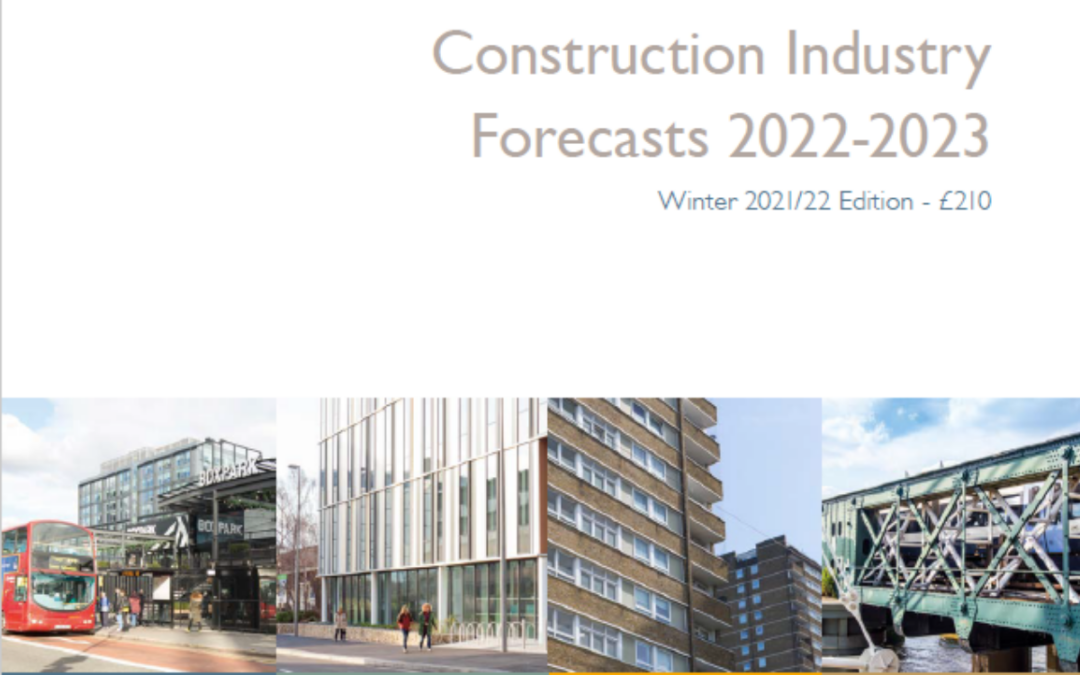
by Clair Mooney | 24 Jan, 2022 | Market data
In its latest quarterly forecast, the Construction Products Association (CPA) forecasts that output in the industry will grow by 4.3% in 2022, slowing to 2.5% in 2023 compared to the 13.3% seen in 2021. This demonstrates the remarkable resilience of the sector to the initial Covid-19 lockdown and the end of the Brexit transition period in 2020. Housebuilding, the largest sector within the UK construction industry, is expected to remain strong whilst infrastructure will be the major driver for growth. Projects already underway in all sectors give great confidence for the forecast figures.
Continuing to benefit from the ‘race for space’, output in private housing is forecast to rise by 3.0% in both 2022 and 2023 following 17.0% growth in 2021. CPA suggests that the double-digit inflation in house prices will fall as the impact of the end of the stamp duty holiday and the further restriction of the Help to Buy scheme feeds through. The outlook for volume remains positive, with most major house builders reporting strong near-term demand and healthy profit margins fuelled by demand for housing in affordable areas of the UK. Also benefiting from the ‘race for space’ in the near-term is the private housing rm&i sector. Here the CPA forecasts output to remain flat at the historically high level reached with 17% growth last year. Rising renovation project costs and higher inflation rates are expected to slow down consumer spending on larger projects. UK households have benefited from building up over £200 billion of savings from the past two years but rising costs are spelling caution for spending compared to 2021.
The CPA Winter Forecast indicates the infrastructure sector to remain as the main driver for growth in 2022. This mirrors the CPA Autumn Forecast which pointed to the five-year spending plans within the regulated sectors of rail, water, roads, and energy, allowing the sector to maintain activity levels and weather supply issues. Key projects include the Thames Tideway Tunnel, Hinkley Point C and HS2. At least two of these projects report delays due to supply constraints and this could result in further work being pushed into 2023. Taking this into account, the sector is still expected to rise by 9.7% in 2022 and 1.1% in 2023, taking the sector to a new all-time high.
Product supply issues, a major challenge in 2021, have eased recently, but may still cause problems. The CPA still considers these to be the biggest challenge to overall growth. Questions over sufficient materials, products, labour, HGV drivers and imports will be at the forefront of industry. These challenges are not spread equally across the sector, with smaller specialist sub-contractors feeling the pressure more.
Major house builders and main contractors are less affected as they have better visibility of medium-term demand and can plan and purchase well in advance; plus, they are the larger customers of the manufacturers, builders’ merchants and importers. Smaller firms, however, have found that availability issues have delayed projects and, consequently, revenue streams whilst sharp cost increases have hit margin, harming their viability even though they have strong workloads. Overall, the latest indications are that supply issues have eased recently, which is a positive sign, although it is still early in the year and before industry activity tends to ramp up in the Spring.

by Clair Mooney | 24 Jan, 2022 | Main News Feed
There is little doubt that with escalating costs forcing us to look ever more carefully at productivity, initiatives like the Golden Thread and BIM and basic customer requirements for us to communicate better, share information in a more structured way and streamline processes that the wave of new digital solutions hitting us are part of the solution, but they can feel part of the problem!
The good news is that help is out there. Following on from developing the Digital Spine in 2021 (a tool to help explain and contextualise technology), FIS have launched a new impartial digital construction helpline and mentoring service in partnership with Digital Construction Skills. Beyond the advice, guidance and developing case studies we are also looking at opportunities to identify funding to support investment. Beyond R&D Tax Credits (which can be an excellent way to recoup investment), we have identified two options that may be worth consideration for FIS Members.
The CITB Skills and Training Fund
Get £10 – £25k for digital Skills training including laser scanner, BIM, AutoCAD, 3D mapping and modelling, robotic total station or drones training.
The criteria for the CITB medium sized Skills and Training Fund has changed. Through this fund, construction companies with between 100 and 250 employees can apply for between £10,000 and £25,000 (depending on their size). Note: CITB have removed the criteria that the training must be new, therefore allowing businesses to repeat things they have done before or use the funding for skills related training.
The Help to Grow Digital scheme to support smaller businesses in adopting digital technologies is now open for applications.
Under the scheme, eligible businesses can receive discounts of up to £5,000 off the retail price of approved digital accounting and CRM software from leading technology suppliers. This software will assist them in effectively managing finances and building customer relationships, and help them to scale up.
Businesses can also access practical support and advice on how to choose the right digital technologies to boost their growth and productivity through a new online platform.
A toolkit to promote the scheme is available here.
Commenting on these funds, Saffron Grant FIS Digital Champion stated:
“This is another example of the support out there for SMEs to take that giant leap into the digital space that in many cases is only a small step! Through the FIS free digital helpline we can help to talk you through the options and help you identify how you can make use of funding of this type. The digital revolution is happening in construction, but it comes with a lot of noise and misinformation. The work we are doing with FIS is about helping to tap into the right support and to find your digital path.”
More support via the FIS Digital Toolkit


by Clair Mooney | 21 Jan, 2022 | Main News Feed
In light of recent figures from ONS on vaccine rates, Construction Minister Lee Rowley is urging construction workers to get their COVID‐19 booster. The Government has published a free employer toolkit containing a range of resources, such as briefing sheets, animations and posters, which can be used to increase awareness within the workplace and provide workers with access to reliable and accurate information on vaccines. Employers are also being asked to be as flexible as possible when it comes to workers getting their jabs, which could include giving paid time off work to attend vaccination appointments.
As businesses may be considering a vaccination policy, FIS Associate Member Citation has updated its guidance for employers to cover the potential use of the NHS COVID Pass for accessing sites, which is generally not advisable. Citation is also hosting a free webinar next Thursday 27 January from 10 – 11:00am to discuss and take questions on vaccination and testing of employees.
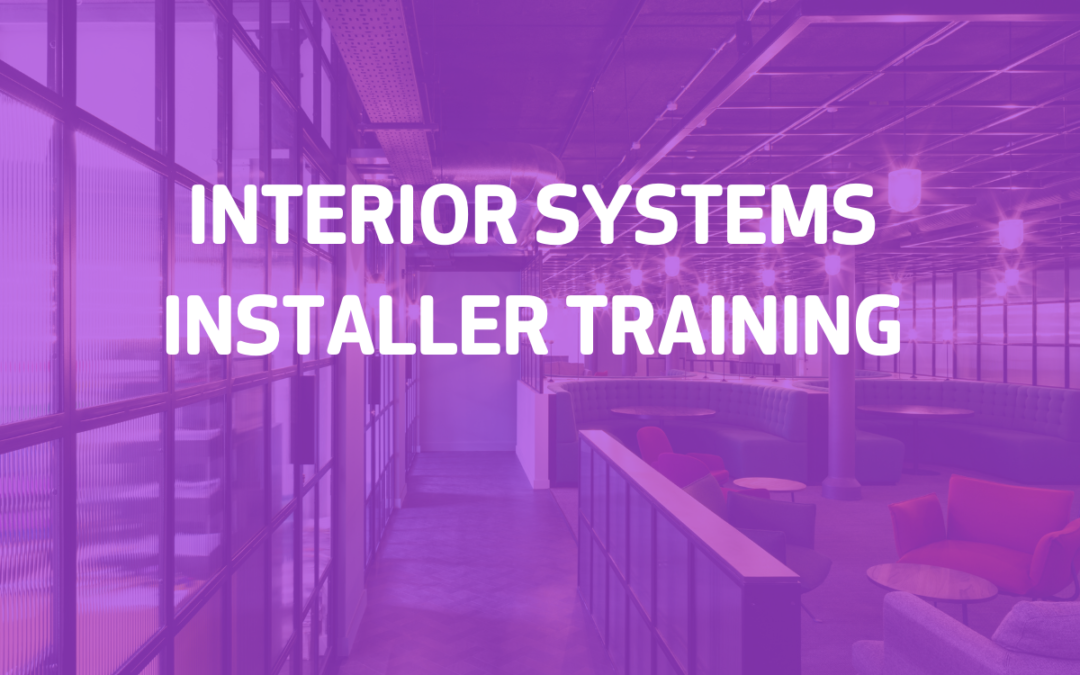
by Clair Mooney | 21 Jan, 2022 | Main News Feed, Skills
The National Construction College in Bircham Newton (Norfolk) have scheduled two courses to train apprentices in Drylining Fixer Boarder and Interior Systems Installer. These are block release courses and are scheduled to start on the following dates:
- Monday 12 September 2022
- Monday 28 November 2022
For full details please contact Andrew Voase, andrew.voase@citb.co.uk 07798 628902 or Trudie Blackshaw, trudie.blackshaw@citb.co.uk telephone 07770 841816.
If an employer or group of employers have at least 12 apprentices, that they would like trained at NCC East prior to the scheduled courses above, NCC have offered to provide a further course. Email FIS Skills and Training Lead George Swann with the following information to register your interest
- Your organisation
- Named contact and contact details
- Number of apprentices
- Which option, Dryliner or Ceilings and partitions
- Preferred start date for the apprentices training
The apprenticeship standard is available at https://www.instituteforapprenticeships.org/apprenticeship-standards/interior-systems-installer-v1-0 this provides the criteria on which the training programmes are based.
For organisations that are CITB registered, grants are available for apprentice travel and subsistence covering up to 80% of the costs, please see: Apprenticeship travel and accommodation funding ‘Travel to Train’ – CITB

by Clair Mooney | 21 Jan, 2022 | Drylining, Skills
CITB is looking for support to assist with its development of a traineeship for drylining occupations.
Employers and subject matter experts are invited to the meeting on Friday 28 January between 13:00 – 15:00. If you are interested in attending, contact Alexandra Lee at CITB on 07500 880181 or email alexandra.lee@citb.co.uk. To view the current version please see: Draft Dry Lining Traineeship v6.docx
What is a Traineeship
A traineeship is a skills development programme that includes a work experience placement. Traineeships help prepare young people aged 16 to 24, or 25 with an education, health and care plan, for employment or an apprenticeship. Traineeships must include at least 70 hours of work experience placement. They can last from 6 weeks up to 1 year, but most last less than 6 months. Employers can offer a work experience placement to a trainee. They will work with a training provider to design the workplace element of the programme. Traineeships are introductory courses to attract individuals, at risk of becoming long term unemployed into employment, the training should be broad and provide as much variety as possible with the work experience placement focused on a specialism.
The training provider will assess the needs of the trainee. Trainees may need pre-employment training before starting their work experience placement. Employers will then work with the training provider to plan and agree:
- the length of the work experience placement
- the days the trainee works
- how the programme will be delivered
Traineeships are flexible. Employers can change the programme as they go to make sure they and the trainee get the most out of it.
Employers must provide:
- a safe, meaningful and high-quality work experience placement
- a minimum of 70 hours of work experience placement over the duration of the traineeship (if the trainee claims benefits, the placement cannot last longer than 240 hours)
- constructive feedback and advice to the trainee
- an interview for an apprenticeship or job in their organisation at the end of the traineeship if one is available
- an exit interview at the end of the traineeship with meaningful written feedback if no job is available
Offering a work experience placement gives employers the chance to:
- get to know and work with a young person to see if they’re right for an apprenticeship or job in their business
- design a programme that suits the needs of the trainee and their business
- develop current employees’ experience in training and mentoring
- recruit new talent for their business
- claim an employer incentive of £1,000 when a work experience placement of over 70 hours has been completed
Employers who make new work experience placement opportunities available may be eligible for an incentive payment of £1,000 per trainee. They can claim this incentive for up to 10 learners per region. Employers decide how to use the money. You can view more guidance on employer incentive payments and how to claim them.
Traineeships are funded by the government. Traineeships are free to the employer, but they may choose to support trainees with expenses such as transport and meals. If you are interested in offering a work experience placement for a traineeship:
- Contact the National Apprenticeship Service to register your interest and to ask for advice and support on traineeships. They can help you set up a traineeship and advertise it on Find a traineeship.
- Partner with a training provider who will help you to design a traineeship that will meet your business needs. They will also advertise the work experience placement for you.
- Agree with the trainee and your training provider exactly what each of you expects from the traineeship.
George Swann FIS Skills and Training Lead says “Traineeships are part of the Governments Plans for Jobs; in the current system approximately 60% to 70% of people on construction training courses delivered by FE do not enter the construction industry. By providing more variety in the college element, introducing individuals to the wide range of careers available, Dry Lining Fixer Boarder and Finisher, Ceiling and Partitions Fixer, Plasterer solid and fibrous something should hook their interest and the work experience placement will put them in the work environment and show what the occupational specialism is about. It’s worth employers giving this a try as addressing the labour shortages is all about home grow talent and if you find capable individuals, well enough said. I encourage all employers and subject matter experts to get involved with the development work of CITB the more variety finishes, and interiors Traineeships have the greater the exposure of the fantastic opportunities this sector has to offer and more young people it should attract….Bigger net more fish”.

by Clair Mooney | 21 Jan, 2022 | Labour, Main News Feed, Material Shortages
Inflation has hit the headlines this week with figures not seen since the early 1990s reported by the Bank of England. Against this backdrop Iain McIlwee, CEO at the Finishes and Interiors Sector (FIS) reveals new data from the FIS that raises concerns over the squeeze on the supply chain, particularly subcontractors and asks the question: are our contracts and procurement processes and the reliance on fixed price equipped to handle inflation at this pace and scale?
The latest UK Market View report published by Mace Consulting in January is anticipating tender-prices to be 4.5 per cent higher this year. Whilst a significant jump on previous forecasts, FIS is questioning whether this is enough.
Within the Finishes and Interiors Sector, Material price inflation averaged around 20% in 2021, even higher in some cases such as timber and steel. Whilst there is evidence that prices may have started to stabilise, warnings from Arcadis, CLC and reports from FIS members highlight the next inflationary pressure is the escalating energy costs. Businesses are not protected in the same way as consumers and the pinch is starting to be felt.
But this is only part of the pressure on sub-contractors. The FIS Wage Rate Survey H2 2021 conducted in December revealed that, across the trades, FIS members have experienced significant wage rate increases particularly in key trade occupations, such as second fix carpenters and dryliners.
Commenting on the survey, FIS CEO Iain McIlwee stated: “It is good to see headline contract values are increasing, but to my mind the maths doesn’t work and they are not moving in line with costs. For most sub-contractors, the core costs of labour and materials will typically represent, according to our latest research, around 80% of business costs. Fuel bills, energy bills are all mounting too; 4.5% doesn’t cut it when the base costs are far exceeding this.
Added to this we are seeing projects subjected to severe delays, programmes out of sync due to the upheavals and in a fixed price environment, this is a real concern and adds further cost and risk.”
Continuing, he said: “I suspect these pressures are felt most acutely in the finishes and interiors sector, as we are late in the programme. We have to look, as a supply chain, more carefully at how we are pricing work and risk. We must also use contracts better (including fluctuation clauses) and ultimately recognise that sub-contractors are often being asked to hold more than their fair share of price, time and design risk.
Negative behaviours are adding to the cost pressures and we are seeng insurance increasingly difficult to secure and premiums continuing to rise, in some cases by eye-watering amounts – this before we factor in some of the changes to legislaton such as the Defective Premises Act now proposed. With legacy concerns and adversarial negotiations and disputes still sadly commonplace, we know of a few companies that have decided that it is not worth carrying on or have sadly entered administration this year. More will follow and corners will be cut unless we start to shift the dial, price the risks, generate sufficient time and capital to invest in people and technology and use the conflict avoidance process to work more collaboratively as a supply chain.”
For further information or for any questions, please contact FIS at info@thefis.org or call 0121 707 0077.




















